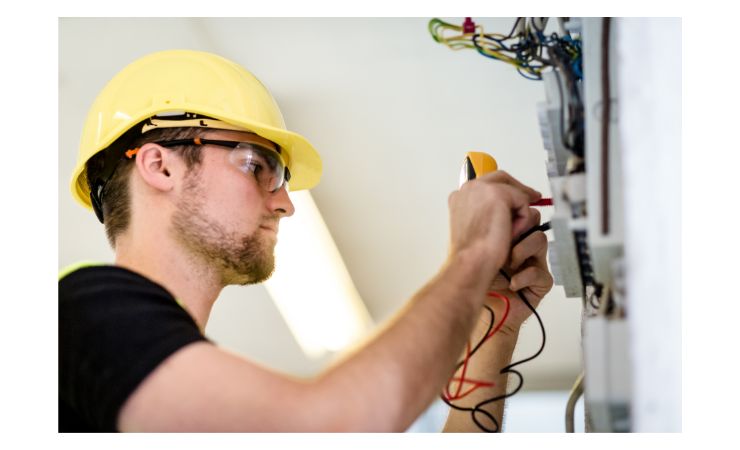Professional electricians install, inspect, maintain, and repair electrical systems for several kinds of clients, including householders, commercial and residential landlords, letting agents, housing associations, local governments, schools, and colleges. Many electricians also complete sub-contract work on new-build properties, extensions and refurbishments for local builders and construction firms.
This profile provides information around starting up and trading as an electrician. Exploring the skills required, available training and some of the current market trends. A complete industry insight guide is available with various purchases including or ever popular reserve name, saving your chosen limited company name for your future use.
Qualifications and skills
Every electrician needs a combination of appropriate recognised qualifications and relevant experience. Many electricians who start their own business have gained on-the-job experience and qualifications through apprenticeship. Nevertheless, there are practical courses available for anyone who is new to the trade, or for less knowledgeable electricians to expand their skills and ability.
Examples of courses include www.tradeskills4u.co.uk/pages/beginner, www.ableskills.co.uk/electrician-training-courses and www.electriciancourses4u.co.uk/courses.
A qualified electrician is required to meet a set of formal qualifications before they can perform self-certifying work within the scope of building regulations or enter and work on construction sites.
- To self-certify work within the scope of the Building Regulations 2010 in England and Wales and equivalent regulations in Scotland and Northern Ireland, electricians must join an approved certification body, admission will usually require them to complete formal training in the type of work that they want to carry out and pass an assessment.
Suitable courses for electricians include:
Requirements for Electrical Installations (www.tradeskills4u.co.uk/courses/18th-edition-courses-bs7671)
Domestic Electrical Course Package (www.tradeskills4u.co.uk/courses/domestic-installer-course).
- Electrotechnical Certification Scheme (ECS) cards are usually required for electricians working on construction sites, such as new-build properties. To qualify, applicants must pass a health, safety and environment assessment and hold, or be working towards, a relevant qualification (www.ecscard.org.uk/content/How-to-Apply).
Additionally, some electricians undergo additional training to provide PAT testing (portable appliance testing), install electric vehicle charging points, or become specialist installers.
Examples of courses include:
- The Level 3 Award in Domestic, Commercial and Industrial Electric Vehicle Charging Equipment Installation run by Trade Skills 4 U, which costs £375 (inc VAT). The two-day course covers installing, testing and inspection of electric car and vehicle charging equipment. Go to www.tradeskills4u.co.uk/courses/electric-vehicle-charging-course for more information.
- The Level 3 Certificate for the Code of Practice for In-Service Inspection and Testing of Electrical Equipment course run by NICEIC. For information on the 2 day course, costing £342 (inc VAT) see www.niceic.com/i-am-a-contractor/training-courses/electrical-courses/portable-appliance-testing
- A 5-day solar PV installation and maintenance course (£720 inc VAT) provided by BPEC, covers both design and installation of solar PV. www.tradeskills4u.co.uk/courses/bpec-solar-pv
- Specialist installer courses run by Trade Skills 4 U, which include among others installation of trunking and conduit for wiring systems, fire alarms & electric gates. See www.tradeskills4u.co.uk/courses/category/specialist-installer
Current market trends
There are currently several opportunities for new and established electricians.
- It is estimated that the UK will need 15,000 more fully qualified electricians by 2024, according to National Electrotechnical Training (NET). A shortage of 7,500-10,000 electricians would still exist even if an additional 5,000 apprentices qualified by 2023. The need for skilled electrical workers will be driven by e-mobility, ‘smart’ and Wi-Fi technology. (www.the-esp.org.uk/2019/04/10/over-12500-electricians-needed-for-new-technology-skills-demand).
- There are opportunities for electricians to join electric vehicle charging installer schemes or receive funding to install electric vehicle charging points at homes and businesses. The UK Government announced, in November 2020, that the sales of new diesel and petrol vehicles will be phased out by 2030, and by 2035 all new cars and vans will be required to be fully zero emission at the tailpipe. More information about the schemes is available in the Trading, commercial and legal issues section of the full profile, available with most business purchases on our website.
- Franchises are a source of both opportunities and competition for start-up electricians. Examples include Mr Electric (www.mr-electric.co.uk/become-a-franchisee)
Purchase almost any of the business registration packages on our site and you will receive a full comprehensive business insight report on your chosen field. The full report gives vital information on Construction Industry Scheme and working as a subcontractor, tendering for contracts, both public and private and information on region specific building regulations.
If you’re not ready to start but would like to secure your name for the future use check out our reserve company name product, this will include the industry report.
Just one more thing……. every month we give away the best business books, downloads and templates in our newsletters. Sign up below ⬇️






